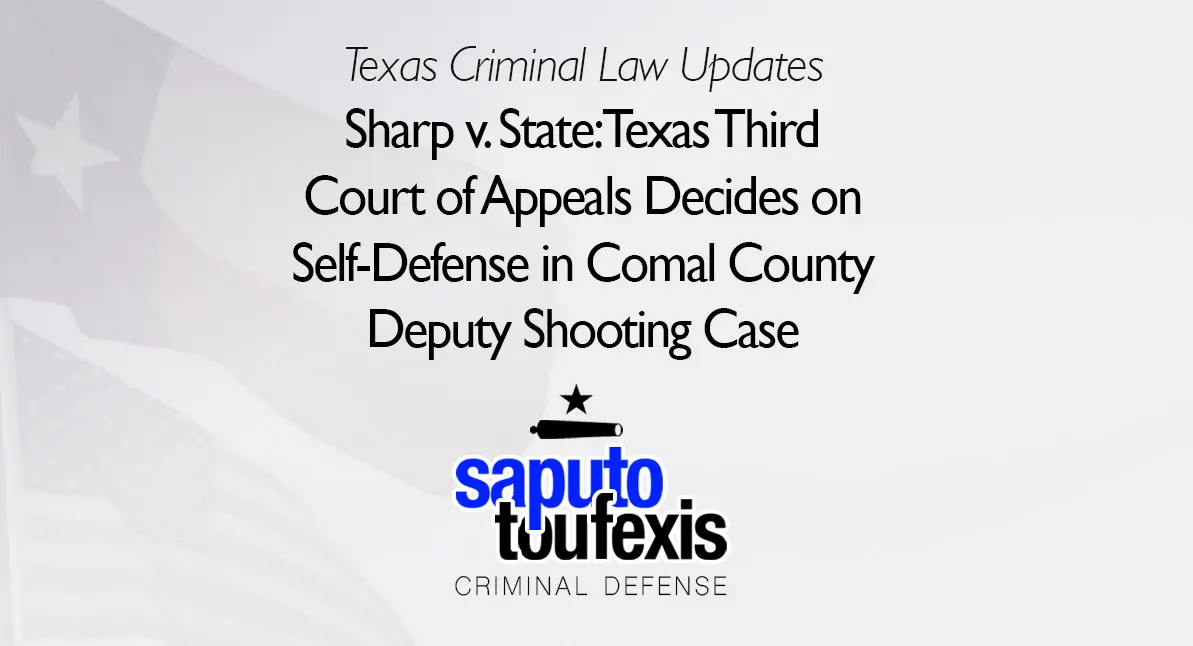Overview of Sharp v. State from the Third District Court of Appeals in Texas
In Sharp v. State, a case from the 207th District Court of Comal County, Brian Scott Sharp was convicted of the first-degree felony offenses of attempted capital murder of a peace officer and aggravated assault against a public servant. The convictions were appealed based on the denial of a self-defense instruction and alleged prosecutorial misconduct during closing arguments.
We’re not just Texas Criminal Defense Lawyers.
We are warriors fighting unjust and corrupt government prosecutions with a history of success and a reputation for tenacity, courage and legal ingenuity.
The Third District Court of Appeals filed an opinion affirming the verdict on April 11, 2024. The appellate court examined whether the trial court erred by not including a self-defense instruction in the jury charge when the deputies executed a search warrant by hitting a sledgehammer against the defendant’s door, kicked it open, and then drew a weapon on the defendant.
Details of the Incident Leading to Sharp’s Conviction
The incident occurred when Comal County deputies attempted to serve a felony arrest warrant on Sharp at his residence. After Sharp barricaded himself inside his home, a standoff ensued which ended dramatically when Sharp shot Deputy Eddy Luna, causing serious injuries that led to the amputation of Luna’s arm.
After approximately thirty more minutes and obtaining approval from their sergeant, Deputy Nolte hit a sledgehammer against one of the doors and then kicked it open with his foot. As the door opened, Deputies Nolte and Eddy Luna were next to each other in the doorway, Deputy Eddy Luna drew his gun, and Sharp shot Deputy Eddy Luna in the arm with a shotgun.
Arguments and Evidence Presented at Trial
During the trial, the prosecution presented evidence from deputies and a crime scene specialist to support the charges. Sharp’s defense argued that he acted in self-defense and criticized the deputies’ failure to involve crisis negotiation teams. Despite these arguments, the jury found Sharp guilty on multiple charges.
Sharp v. State Appeal in the Texas Third Court of Appeals
On appeal, Sharp contended that the trial court erred by not providing a jury instruction on self-defense. He also accused the prosecution of improper conduct in closing arguments. The Texas Third Court of Appeals found that the evidence did not support Sharp’s self-defense claim and that no prosecutorial misconduct occurred sufficient to overturn the conviction.
Legal Analysis by the Texas Third Court of Appeals
The appellate court analyzed the legal standards for self-defense and the conduct of law enforcement during the incident. It concluded that the deputies acted within their legal rights to arrest Sharp and that Sharp’s use of deadly force was not justified under Texas law.
The appellate court cited the general self-defense law:
Generally, “a person is justified in using force against another when and to the degree the actor reasonably believes the force is immediately necessary to protect the actor against the other’s use or attempted use of unlawful force.”
However, the court’s opinion stated that to be entitled to a self-defense instruction under the plain language of these statutory provisions, it was Sharp’s burden to present some evidence that the deputies used “unlawful force” and that before he offered “any resistance,” the deputies used or attempted “to use greater force than necessary to make the arrest.” The court concluded:
“Sharp’s testimony, assuming it is credible, does not support reasonable inferences that the deputies used unlawful force against Sharp, that he reasonably believed that deadly force was “immediately necessary” to protect himself against the deputies’ “use or attempted use of unlawful deadly force” when he shot the shotgun, or that they “used or attempted to use greater force than necessary” before Sharp resisted being arrested.”
Impact of the Appellate Decision in Comal County, Texas
The decision of the Texas Third Court of Appeals in Sharp v. State holds significant implications for self-defense claims against law enforcement in Texas. The ruling underscores the rigorous standards required to establish such a defense, particularly when law enforcement officers are involved in the lawful execution of their duties.








